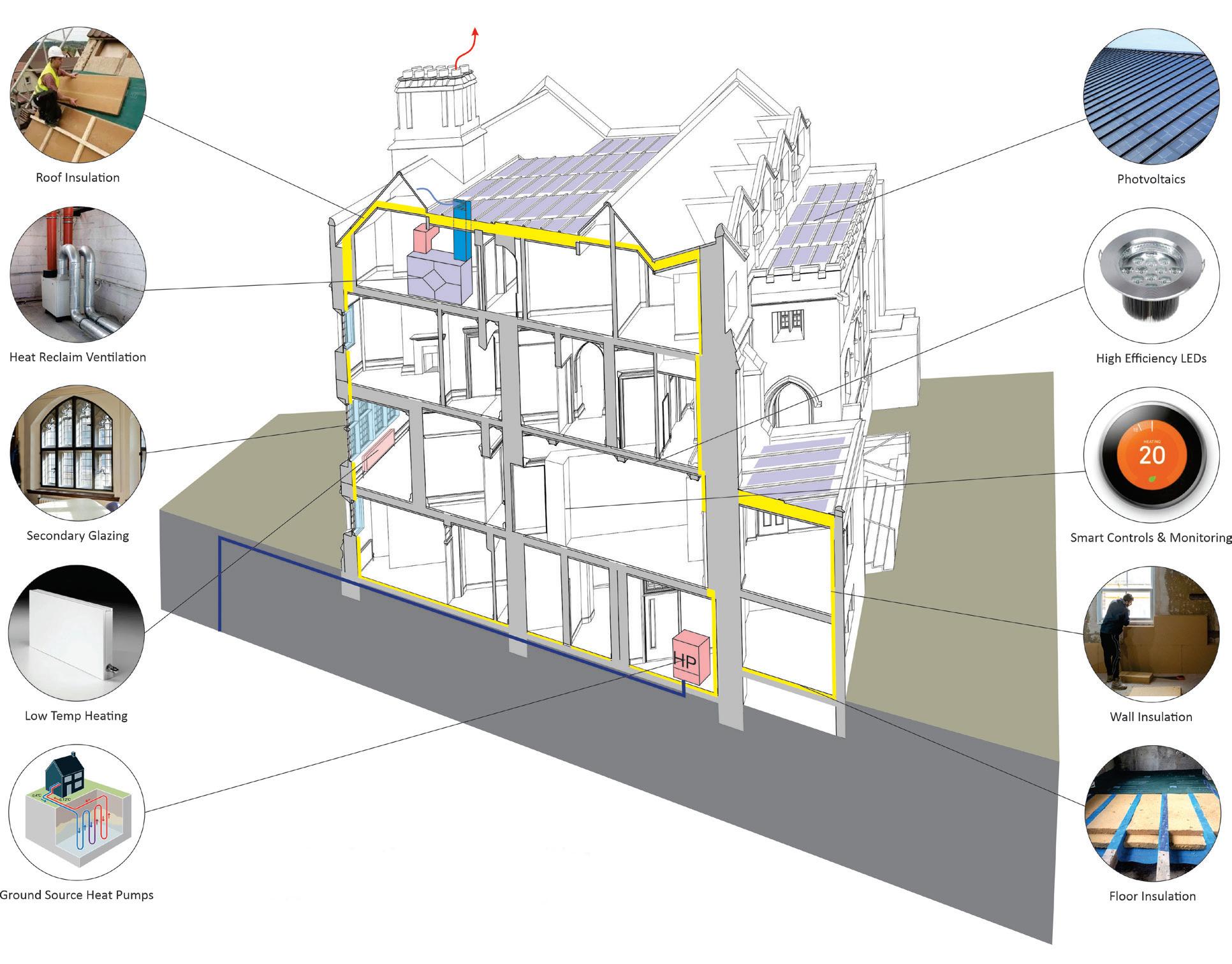
4 minute read
Treading lightly
The Estate Development Strategy includes plans to reduce Mansfield’s carbon footprint and enhance biodiversity and wider sustainability – in keeping with the College’s 2030 goals. Working with sustainability consultant, Skelly & Couch, and the project team, the College has highlighted eight areas for sustainability improvements. Students have been closely involved; here they share their views.
Phillis Agbo Senior Development Manager at Stories
Energy – operational carbon
‘If the UK is to reach net-zero carbon targets by 2050, it’s important for us to do our part in creating sustainable buildings that incorporate high efficiency design: from passive solar to on-site renewable energy generation.’
Connor Durkin (MSc Environmental Change & Management, 2023)
Although the College has taken steps towards improving its energy sources, energy usage and energy wastage, there is only so much that can be done, given its beautiful Champneys buildings and the ‘leaky’ bedrooms to the south. The development project can make the College more efficient with, and more cognisant of its energy use. Much can be done sympathetically to the historic buildings to manage their energy requirements better. Also, climate-controlled bedrooms and teaching spaces can be delivered. Mansfield aims to reduce carbon emissions from existing buildings by 50-80% between now and 2050. Where providing new buildings, the Strategy will ensure they are net-zero carbon in terms of operational energy.
Sustainable communities and social value
‘Mansfield innovates on equality and social values, and we have the potential to be at the forefront of technology and sustainability. Physical planning could be optimised to create a place where people feel connected to both community and the environment.’
Charlotte Wargniez (MSc Sustainability, Enterprise & the Environment, 2023)
The College prides itself on being open, welcoming and inclusive. This building project will create fit-for-purpose community spaces, secure private spaces and strengthen Mansfield’s open nature by improving the gateway to the College.
Good health and wellbeing
‘College life is very important to my health. I’d love to have a gym on site, improved kitchen facilities, more locally sourced foods, more interaction with animals and access gardens to improve mental health.’
Alice Gallagher Boyden (MSt English, 2023)
Buildings and external spaces can foster good health in many ways. The new designs will look to enhance wellbeing using daylight, sunlight, natural materials, thermal mass, connections to nature, fresh air and spaces facilitating social interactions.
Finance and facilitation
‘Mansfield could be a leader in what a sustainable college looks like. I’d like to see the College assess its activities and affiliations and consider how it contributes to an environmentally sustainable future.’
Hannah Sassi (MSc Sustainability, Enterprise & the Environment, 2023)
Mansfield is not just concerned with environmental sustainability but is determined to become more financially resilient. Through development, Mansfield will have a better understanding of its energy use. This information is key to improving operational efficiency and reducing costs.

Buildings – embodied carbon
‘It’s important to me that Mansfield does its part to mitigate climate change and minimise embodied carbon while also creating a comfortable environment.’
Laura Murphy (MSc Biodiversity, Conservation & Management, 2023)
Mansfield is fortunate that its historic and more recent buildings are made from stone and timber which are naturally low in embodied carbon. Additional development needs to carefully consider the environmental impact of materials used. This project will assess Whole Life Carbon, durability and robustness as key metrics.
Resources
‘I would love Mansfield to demonstrate leadership in stewarding our natural resources, including managing water impacts, pollution, and waste.’
Jordan Calverley (MSc Sustainability, Enterprise & the Environment, 2023)
Due to climate change, water will probably become scarce in the not-too-distant future. Mansfield could improve its water-recycling capabilities and educate its community to be more resource conscious.
Biodiversity
‘It’s important that sustainability strategies combine nature-based solutions during site design and management of existing areas such as gardens and greens.’
Leonard Jenkins (MSc Sustainability, Enterprise & the Environment, 2023)
Mansfield has a direct and indirect impact on biodiversity both within and outside its estate. The College is aiming for a biodiversity gain of over 10%. The development project will consider bringing planting within the buildings and potentially on roofs.
Travel
‘It’s great to have an accessible college with safe biking routes connected to town. I would like to see wider biking routes, and more flexible support for biking and bike safety from the College.’
Maia Vitkovic (MSc Biodiversity, Conservation & Management, 2023)
Mansfield’s location in central Oxford helps limit its need for motorised transport. The College already promotes walking and cycling but wishes to provide better cycle storage. Where driving is necessary, charging infrastructure can be provided for electric vehicles.
If Mansfield is to achieve its sustainability goals in its stipulated timeframe, immediate action must be taken. The College’s transformational development project identifies many ways of achieving these ambitious goals, both realistically and tangibly.

